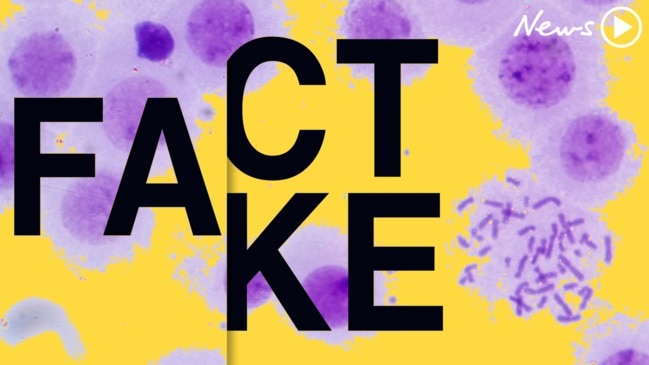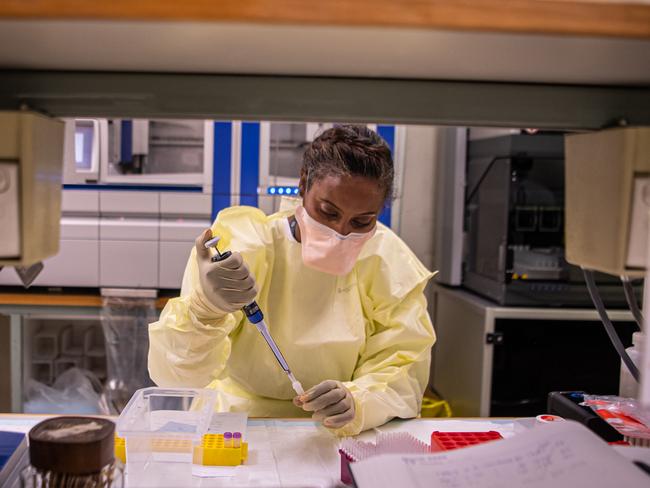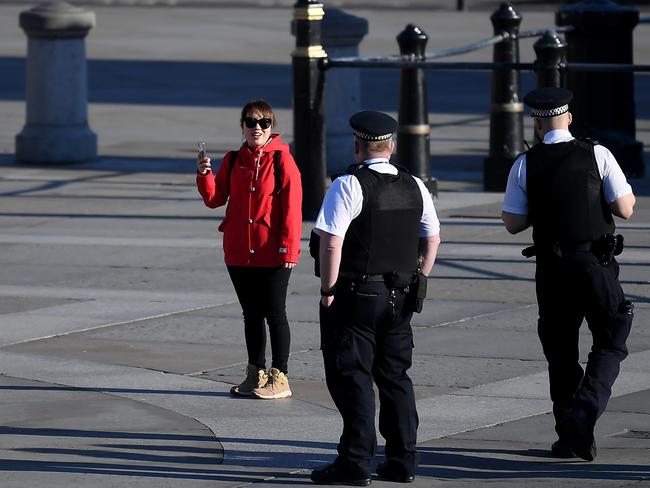Coronavirus: Australia orders 1.5m virus finger-prick tests
Australian researchers are trialling a new drug to see if it can prevent coronavirus in health workers as the Morrison government orders fingerprick tests to be used at airports and GP clinics.

Illness
Don't miss out on the headlines from Illness. Followed categories will be added to My News.
- 15m Aussies could catch virus within months
- Please, don’t let your local businesses die on your watch
Melbourne researchers will trial a drug used to treat the auto-immune disease lupus to see if it can prevent COVID-19 in health workers.
It comes as an extra 1.5 million face masks and 63,000 COVID-19 test kits have arrived in Australia, with millions more on order as state and federal governments gear up for the worsening outbreak.
Home coronavirus test-kits could also soon become readily available from Amazon and major pharmacy chain, Boots, in the UK.
While there are none available to the public at present, it could be a number of days – not weeks – until they are approved and are.
Earlier, the Australian government ordered 1.5 million finger-prick tests for COVID-19 which could be used at airports and GP clinics to quickly identify people with the virus.
Meanwhile US researchers have identified 69 existing or experimental medications including drugs used for schizophrenia, Type 2 diabetes ad Parkinson’s disease they believe might help treat COVID-19.
The scientists reported in a paper published on the web site bioRxiv they had cloned and tagged 26 of coronavirus’ 29 genes.

This allowed them to identify 66 human proteins that could be targeted by 69 existing FDA-approved drugs, drugs in clinical trials and/or preclinical compounds that they are now evaluating for treating COVID-19.
On the list of potential treatments are the drug haloperidol, used to treat schizophrenia, and metformin, taken by people with Type 2 diabetes.
The malaria drug hydroxychloroquine which has emerged as a promising treatment is on the list as well as a Parkinson’s disease treatment.

It comes as health practitioners warned people racing to stockpile hydroxychloroquine it can have serious side effects affecting the stomach, vision and in some cases death.
The Pharmaceutical Society of Australia has told chemists not to dispense the drug to people scared of COVID-19 after doctors and dentists began writing scripts for the drug.
Only patients using it for approved conditions such as malaria or Rheumatoid arthritis should be given the medication the PSA said.
DOCTORS LOOK AT USING BLOOD FROM RECOVERED PATIENTS
Earlier, it was revealed that a stop gap “passive vaccine” for COVID-19 will see antibodies harvested from the blood of patients who have recovered from the virus injected into vulnerable people.
It comes as losing your sense of smell has emerged as one of the first signs of COVID-19.
Meanwhile University of Queensland researchers are looking for 100 healthy volunteers to take part in clinical trials of a candidate vaccine for COVID-19 in the middle of the year.
The Doherty Institute in Melbourne is working on a new rapid COVID-19 test that takes just 30 minutes to get a result an improvement on the three hours it takes now.
And chemists have been told to refuse to fill scripts for malaria drug hydroxychloroquine which has emerged as a promising cure for COVID-19 as panic buying threatens to overwhelm supplies.
The Doherty Institute has been given $2 million in funding to work on a short term “passive vaccine” against coronavirus that could be given to health workers and vulnerable patients.
It extends work undertaken by researchers in China who trailed injecting the blood plasma of people who recovered from COVID-19 into sick people in the hope the antibodies would help clear the infection.

The Paul Ramsay Foundation has donated $2 million towards the project.
The injection would have to be repeated every two months but could provide protection for health workers and vulnerable Australians until a proper vaccine can be developed.
The Doherty Institute is also working on a new rapid COVID 19 test that takes just 30 minutes to get a result an improvement on the three hours it takes now.
Meanwhile University of Queensland researchers are poised to start clinical trials of a candidate vaccine for COIVID-19 in the middle of the year.
UQ researcher Dr Keith Chappell said the vaccine was looking “extraordinarily good” but it could be 12 months before it was ready to use even if trials were successful.
Ear nose and throat doctors in Korea, German and the UK have reported that losing your sense of smell could be one of the first signs you have COVID-19.
One in three COVID-19 patients in Korea and half the patients in Germany suffered a decline in their ability to smell and could help identify people who had the virus but showed no symptoms Flinders University Professor Simon Carney said.

Excitement about a potential “cure” for COVID 19 about to be trialled in 50 Australian hospitals has caused a run people purchasing the malaria drug hydroxychloroquine.
News Corp reported on the weekend it was one of two drugs that will be trialled in combination on patients in 50 Australian hospitals to beat the virus.
US President Trump also mentioned the drug in a recent news conference.
The Pharmaceutical Society of Australia asked chemists not to dispense the drug unless it was for inflammatory conditions or the suppression and treatment of malaria.
Australian community pharmacies have seen unprecedented demand for the drug as doctors prescribed it for other doctors and their families; dentists prescribed it to patients and their families; Non-medical prescribers prescribed bulk amounts of the drug, he said.
“If this medication does indeed have the efficacy that we would desire against COVID-19 then it needs to be prescribed and used judiciously,” PSA president Associate Professor Chris Freeman said.
FINGER-PRICK TESTING A ‘GAME-CHANGER’: UK
A coronavirus home test kit will be available “within days” – from Amazon and Boots pharmacies in the UK, the British Government has revealed.
The finger-prick test, which detects antibodies to the virus in the blood, is able to determine if someone has or has already had COVID-19.
According to The Sun, when a person gets infected by the virus, the body starts making specially designed proteins called antibodies to fight the infection.

After they recover, those antibodies stay floating in the blood for months, even years.
MPs heard that 3.5 million antibody tests have now been bought and will allow key workers – like doctors and nurses – to go back to work.
Professor Sharon Peacock, director of the National Infection Service at Public Health England (PHE), told the Science and Technology Committee that the public will be able to carry out coronavirus antibody tests at home “within days”.
She said a small number of the checks would be tested in a laboratory before being distributed via Amazon and in places like Boots pharmacies.
Prof Peacock added: “Once we are assured that they do work, they will be rolled out into the community.
“Testing the test is a small matter, and I anticipate that it will be done by the end of this week.

“In the near future people will be able to order a test that they can test themselves, or go to Boots, or somewhere similar to have their finger-prick test done.”
Currently, Public Health England is only testing patients for COVID-19 in hospital with nasal swabs.
This test only shows whether someone has the virus – and not whether they have already recovered from it.
However, the new at-home test would reveal if someone has had the bug and built up immunity, and is therefore unlikely to catch it again.
A Boots UK spokesman told The Sun Online: “We are keen to work with the Government to explore opportunities to support COVID-19 testing.
“However we do not have any type of COVID-19 tests in our stores.
“Customers should not make a trip to a Boots store or pharmacy for this purpose.”

Originally published as Coronavirus: Australia orders 1.5m virus finger-prick tests
